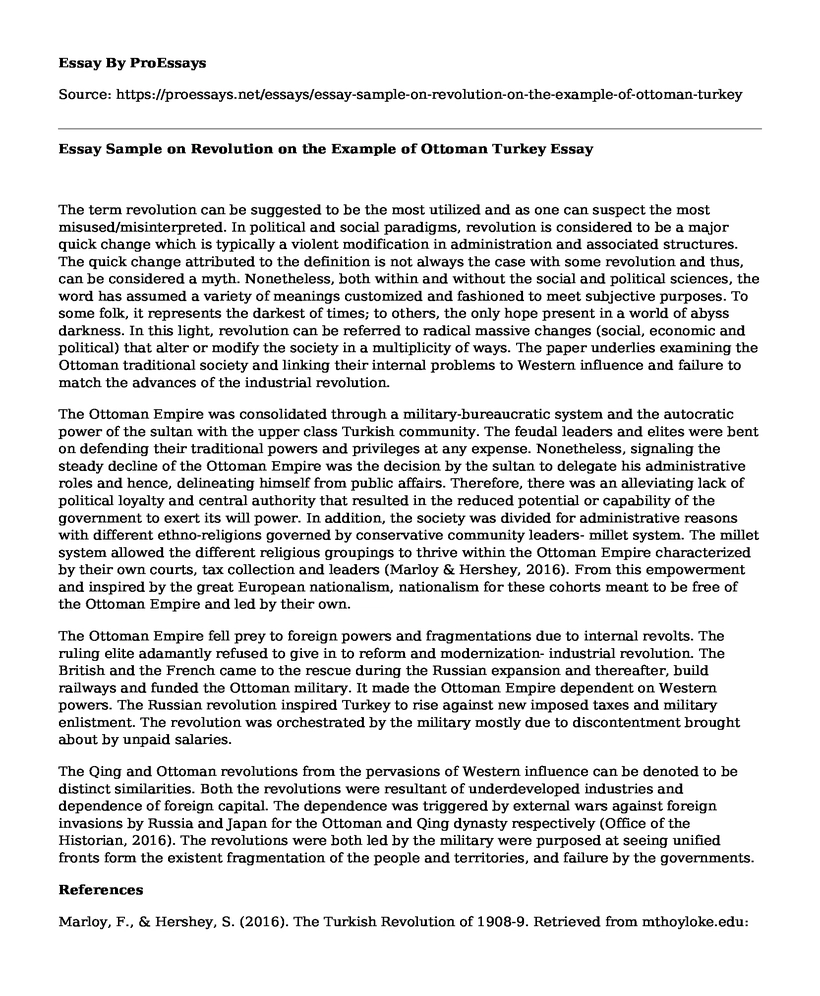The term revolution can be suggested to be the most utilized and as one can suspect the most misused/misinterpreted. In political and social paradigms, revolution is considered to be a major quick change which is typically a violent modification in administration and associated structures. The quick change attributed to the definition is not always the case with some revolution and thus, can be considered a myth. Nonetheless, both within and without the social and political sciences, the word has assumed a variety of meanings customized and fashioned to meet subjective purposes. To some folk, it represents the darkest of times; to others, the only hope present in a world of abyss darkness. In this light, revolution can be referred to radical massive changes (social, economic and political) that alter or modify the society in a multiplicity of ways. The paper underlies examining the Ottoman traditional society and linking their internal problems to Western influence and failure to match the advances of the industrial revolution.
The Ottoman Empire was consolidated through a military-bureaucratic system and the autocratic power of the sultan with the upper class Turkish community. The feudal leaders and elites were bent on defending their traditional powers and privileges at any expense. Nonetheless, signaling the steady decline of the Ottoman Empire was the decision by the sultan to delegate his administrative roles and hence, delineating himself from public affairs. Therefore, there was an alleviating lack of political loyalty and central authority that resulted in the reduced potential or capability of the government to exert its will power. In addition, the society was divided for administrative reasons with different ethno-religions governed by conservative community leaders- millet system. The millet system allowed the different religious groupings to thrive within the Ottoman Empire characterized by their own courts, tax collection and leaders (Marloy & Hershey, 2016). From this empowerment and inspired by the great European nationalism, nationalism for these cohorts meant to be free of the Ottoman Empire and led by their own.
The Ottoman Empire fell prey to foreign powers and fragmentations due to internal revolts. The ruling elite adamantly refused to give in to reform and modernization- industrial revolution. The British and the French came to the rescue during the Russian expansion and thereafter, build railways and funded the Ottoman military. It made the Ottoman Empire dependent on Western powers. The Russian revolution inspired Turkey to rise against new imposed taxes and military enlistment. The revolution was orchestrated by the military mostly due to discontentment brought about by unpaid salaries.
The Qing and Ottoman revolutions from the pervasions of Western influence can be denoted to be distinct similarities. Both the revolutions were resultant of underdeveloped industries and dependence of foreign capital. The dependence was triggered by external wars against foreign invasions by Russia and Japan for the Ottoman and Qing dynasty respectively (Office of the Historian, 2016). The revolutions were both led by the military were purposed at seeing unified fronts form the existent fragmentation of the people and territories, and failure by the governments.
References
Marloy, F., & Hershey, S. (2016). The Turkish Revolution of 1908-9. Retrieved from mthoyloke.edu: https://www.mtholyoke.edu/acad/intrel/boshtml/bos126.htm
Office of the Historian. (2016). The Chinese Revolution of 1911. Retrieved from history.gov: https://history.state.gov/milestones/1899-1913/chinese-rev
Cite this page
Essay Sample on Revolution on the Example of Ottoman Turkey. (2021, Mar 25). Retrieved from https://proessays.net/essays/essay-sample-on-revolution-on-the-example-of-ottoman-turkey
If you are the original author of this essay and no longer wish to have it published on the ProEssays website, please click below to request its removal:
- Paper Example on September 11th Attack
- Research Paper on Population Health Policy Analysis
- Essay Sample on History of American People
- Movie Analysis Essay on "Mr. Polk's War"
- Essay Example on Sovereign Immunity: A Judicial Code of Belief for Restricting Government
- Research Paper on U.S. Loses to Vietnam: Reasons Behind the Historic Defeat
- Essay Sample on Creating a Local Government on a Privately-Owned Island







